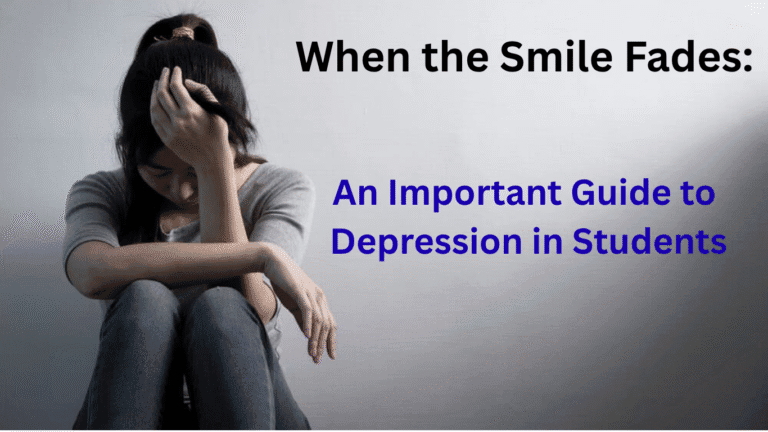Recognizing and Responding to Depression in Students
The Pressure Beneath the Surface
Every year, lakhs of students prepare to crack the toughest exams, win scholarships, or make it to the world’s top universities. Their social media bios are filled with hashtags like #StudyAbroad, #FutureEngineer, or #IvyBound. From the outside, everything seems on track. But behind the glowing screens and high scores, there’s a silent epidemic growing—student depression.
And here’s the truth no one wants to say aloud: it can hit anyone.
The topper, the athlete, the “always cheerful” one, the quiet one.
Recognizing the Signs of Depression in Students
Depression doesn’t always look like tears or breakdowns. Often, it wears the mask of:
Emotional Signs of Depression
- Persistent low mood or sadness lasting more than 2 weeks
- Sudden disinterest in friends, family, or hobbies
- Feelings of worthlessness, failure, or guilt
- Irritability or emotional outbursts
Physical & Behavioral Signs
- Changes in sleep (too much or too little)
- Changes in appetite or eating habits
- Constant fatigue or lack of motivation
- Neglecting appearance or hygiene
Academic Red Flags
- Falling grades despite sincere effort
- Procrastination or inability to complete tasks
- Missing classes or activities
- Saying “What’s the point?” or “I just can’t anymore.”
The Onset: When to Really Pay Attention
Often, the early signs are brushed off as “just stress.” But these moments should ring an internal alarm:
- When a once-social child starts isolating
- When goals they chased passionately suddenly seem “pointless”
- When you hear statements like:
“I’m tired – not sleepy tired, just tired of life.”
“I feel numb.”
“I wish I could disappear for a while.”
These aren’t dramatics. These are cries for help that don’t come with raised hands.
For Parents: How You Can Help
As a parent, it’s terrifying to think your child may be depressed. But your response can shape their healing.
What To Do:
- Talk without judgment. Don’t lecture. Listen.
- Ask open-ended questions. Not “Why are you like this?” but “How can I help you today?”
- Normalize mental health. Let them know it’s okay to not be okay.
- Watch for signs, even subtle ones.
- Encourage counseling. There’s no shame in therapy—it’s strength.
- Create a safe environment. No comparisons. No invalidating statements like
“When I was your age…”
“It’s just a phase.”
Sometimes, your child doesn’t need answers. They just need your quiet presence and your belief in them.
Case in Point: Study Abroad Dreams and Silent Battles
International students—especially those navigating admissions, visa processes, and unfamiliar cultures—are twice as likely to experience depression. They’re under pressure to perform, justify expenses, and live up to expectations. Add homesickness and visa uncertainty—and you have a pressure cooker.
A visa rejection, for example, can spiral into:
- Shame
- Feelings of worthlessness
- Social withdrawal
- Anxiety about the future
These are not failures. They are emotional injuries—and just like physical ones, they need time and care to heal.
What Students Can Do
- Talk. To a friend, mentor, teacher, or counselor. Silence worsens the pain.
- Avoid isolation. Even if it’s just sitting near someone quietly.
- Break big goals into small wins.
- Seek professional help. Therapy is not for the “weak.” It’s a weapon.
- Limit social media. Comparison kills joy.
- Move your body. Exercise, dance, walk—anything that reconnects you to your physical self.
- Connect with a social group. Meet people with common interests, and join yoga or spiritual groups.
Depression is Not a Character Flaw
It’s a health condition, just like asthma or diabetes. It needs awareness, not shame.
And recovery is not linear. There are good days and hard days – but with support, the good days start winning.
FAQs
Q1: How do I know if my child is depressed or just stressed?
If low mood, disinterest, or emotional shutdown continues for more than two weeks, it may be depression.
Q2: Is it okay to seek counseling for exam or visa-related stress?
Absolutely. Any overwhelming stress deserves professional support. Early intervention is key.
Q3: Can students bounce back from depression and still pursue Study Abroad?
Yes. Many do. With therapy, support, and resilience, students not only bounce back—they thrive.
Q4: What’s the role of schools and counselors?
Institutions should offer regular mental health workshops, peer support circles, and access to trained counselors.
Q5: Does depression affect high-achievers too?
Yes. In fact, perfectionists and top scorers are often silently struggling due to self-pressure and fear of failure.
Final Thoughts: Be the Light
If you’re a parent, teacher, or friend—be kind. Be available. Be the one they can call at 3 a.m.
And if you’re a student reading this:
Your worth is not tied to your grades, admits, or scores.
You are enough.
You are not alone.
And you will rise again.
Contact IMFS today for expert counseling and career support to turn your ambitions into reality.





